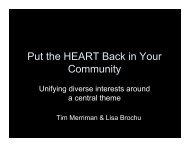Download PDF - Sustainable Tourism Lab
Download PDF - Sustainable Tourism Lab
Download PDF - Sustainable Tourism Lab
You also want an ePaper? Increase the reach of your titles
YUMPU automatically turns print PDFs into web optimized ePapers that Google loves.
The Future of <strong>Sustainable</strong> <strong>Tourism</strong> in Rhode Island<br />
Thursday, January 28, 2010<br />
benefit local communities and provide exemplary notions of how communities could flourish<br />
through (small scale) tourism. These developments also helped identify new tourism markets<br />
that spurred interest in nature-based and indigenous tourism opportunities. Countries such<br />
as Costa Rica developed their tourism industry around this model.<br />
• 1990s – This decade gave rise to a tremendous growth in tourism and continued concern<br />
for environmental degradation and social exclusion (e.g. further expansion of all-inclusive<br />
resorts). With many developers and resort operators wanting to ride the eco-tourism<br />
bandwagon, allegations of “green washing” became common. <strong>Tourism</strong>’s “eco” boom was<br />
turning into a branding bonanza bolstered by extravagant and untrue marketing claims. To<br />
address and counter this disgrace, organizations such as the Eco-<strong>Tourism</strong> Society, decided to<br />
take action. The Society clarified its definition of eco-tourism.<br />
Ecotourism is: “Responsible travel to natural areas that conserves the environment and improves<br />
the well-being of local people.” (TIES, 1990)<br />
Ecotourism is about uniting conservation, communities, and sustainable travel. This means that<br />
those who implement and participate in ecotourism activities should follow the following<br />
ecotourism principles:<br />
• Minimize impact.<br />
• Build environmental and cultural awareness and respect.<br />
• Provide positive experiences for both visitors and hosts.<br />
• Provide direct financial benefits for conservation.<br />
• Provide financial benefits and empowerment for local people.<br />
• Raise sensitivity to host countries’ political, environmental, and social climate.<br />
• More significantly, during this time, the whole world started to take notice of the<br />
importance of the environment. One of the defining documents was the 1987<br />
Brundtland Report, also known as Our Common Future, which alerted the world to<br />
the urgency of making progress toward economic development which could be<br />
sustained without depleting natural resources or harming the environment.<br />
• 2000s – Tremendous activity in the development of sustainability and sustainable<br />
tourism has occurred during the past ten years. Some defining truths that Costas<br />
Christ, through his examples, alluded to include:<br />
Summit Report<br />
14





